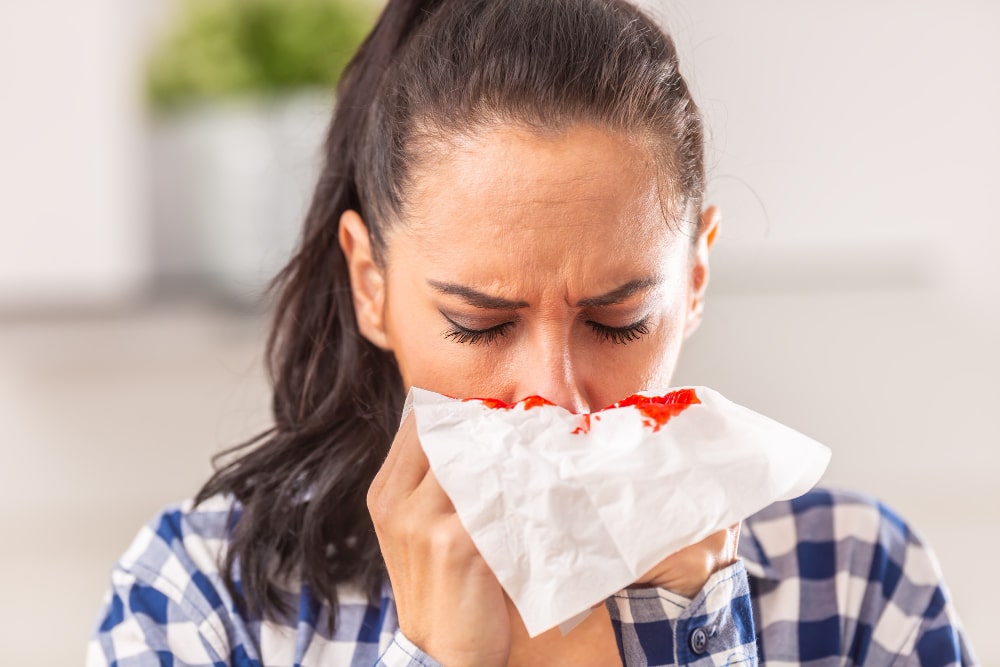Welcome to MarkAntony.org, your go-to destination for comprehensive how-to guides, unlocking knowledge, and mastering essential skills. In this article, we will explore effective techniques and strategies on how to stop a nosebleed quickly and efficiently. Whether you experience nosebleeds frequently or are facing one for the first time, this guide will provide you with expert tips and step-by-step instructions to help you gain control over this common issue. So, let’s dive right in!
Understanding Nosebleeds: Causes and Common Triggers
Nosebleeds, also known as epistaxis, occur when the blood vessels in the nose rupture or become damaged, resulting in bleeding from one or both nostrils. This occurrence can be quite alarming and, in some cases, difficult to manage without proper knowledge and techniques. Let’s take a closer look at the causes and common triggers of nosebleeds.
1. Dry Air: Dry air is a significant factor contributing to nosebleeds, particularly during the winter months when indoor heating systems reduce humidity levels. The lack of moisture can cause nasal passages to become dry and prone to bleeding.
2. Nose-picking: Although it may seem like a harmless habit, picking your nose can lead to nosebleeds. The act of digging into the delicate nasal lining can cause damage to blood vessels, resulting in bleeding.
3. Trauma or Injury: Any injury to the nose, whether from a fall, accident, or sports-related incident, can trigger a nosebleed. The impact can cause blood vessels to rupture, leading to bleeding.
4. Allergies and Sinusitis: Allergic reactions or chronic sinusitis can cause inflammation and irritation in the nasal passages, making blood vessels more susceptible to rupture.
5. Medications: Certain medications, such as anticoagulants (blood thinners) or nonsteroidal anti-inflammatory drugs (NSAIDs), can increase the risk of nosebleeds due to their effect on blood clotting.
6. Underlying Medical Conditions: Various medical conditions, including hypertension (high blood pressure), bleeding disorders, and nasal tumors, can contribute to frequent or severe nosebleeds.
Now that we have a better understanding of the causes and common triggers of nosebleeds, let’s explore effective methods to stop them when they occur.
Immediate Steps to Stop a Nosebleed
When a nosebleed strikes, taking prompt action is crucial to bring it under control. By following these immediate steps, you can effectively stop a nosebleed in its tracks:
1. Sit up straight and lean forward. This position helps prevent blood from flowing down the back of your throat, which can cause gagging or swallowing of blood, leading to an upset stomach.
2. Pinch your nostrils together with your thumb and index finger, applying firm and steady pressure to the soft part of your nose. This action helps compress the blood vessels, aiding in clot formation and stopping the bleeding. Maintain this pressure for at least 10-15 minutes.
3. Breathe through your mouth during this time to ensure an adequate supply of oxygen while the bleeding is controlled.
4. Release the pressure gently after 10-15 minutes and check if the bleeding has stopped. If it hasn’t, continue applying pressure for another 10 minutes before
rechecking.
5. Refrain from blowing your nose or inserting any objects into your nostrils immediately after a nosebleed, as this can disrupt the clotting process and lead to further bleeding.
Following these immediate steps should help stop the bleeding in most cases. However, if the nosebleed persists or recurs frequently, it is advisable to seek medical attention to rule out any underlying causes or complications.
Effective Techniques for Preventing Nosebleeds
Prevention is always better than cure, and when it comes to nosebleeds, adopting certain habits and practices can significantly reduce the likelihood of experiencing them. Consider the following techniques to prevent nosebleeds:
1. Keep your nasal passages moisturized. Applying a thin layer of petroleum jelly or saline nasal spray can help combat dryness and maintain proper moisture levels in your nose, reducing the chances of nosebleeds.
2. Avoid picking your nose. As tempting as it may be, refrain from picking or forcefully blowing your nose, as these actions can damage the delicate blood vessels, leading to nosebleeds. Instead, gently blow your nose or use a saline nasal rinse to clear any congestion.
3. Use a humidifier in your living space, especially during the winter months or in dry climates. A humidifier adds moisture to the air, preventing dryness in your nasal passages and minimizing the risk of nosebleeds.
4. Protect your nose during physical activities. If you engage in sports or activities that pose a risk of facial injury, such as boxing or soccer, consider wearing protective gear like a helmet or face shield to prevent trauma to your nose.
5. Manage underlying medical conditions. If you have hypertension, allergies, or any other medical condition contributing to nosebleeds, work closely with your healthcare provider to manage and control these conditions effectively. Following their prescribed treatment plans and medications can reduce the frequency and severity of nosebleeds.
By implementing these preventive measures into your daily routine, you can significantly minimize the occurrence of nosebleeds and ensure a healthier nasal environment.
FAQs (Frequently Asked Questions)
1. Can stress cause nosebleeds?
Yes, stress can contribute to nosebleeds. When you experience stress, your blood pressure may rise, increasing the risk of blood vessel rupture in your nose. Additionally, stress can cause dryness in the nasal passages, making them more prone to bleeding.
2. Should I tilt my head back during a nosebleed?
No, tilting your head back during a nosebleed is not recommended. This position can cause blood to flow down your throat, potentially leading to gagging or swallowing blood. Instead, lean forward slightly and let the blood drain out of your nose while maintaining pressure on your nostrils.
3. Are nosebleeds more common in children?
Yes, nosebleeds are more common in children due to several factors. Children’s blood vessels in the nose are often closer to the surface, making them more susceptible to rupture. Additionally, children may engage in nose-picking or experience more frequent upper respiratory infections, both of which can contribute to nosebleeds.
4. When should I seek medical attention for a nosebleed?
While most
nosebleeds can be managed at home, it is advisable to seek medical attention if:
- The nosebleed lasts for more than 20 minutes despite applying pressure.
- The bleeding is heavy or accompanied by dizziness, lightheadedness, or difficulty breathing.
- You experience frequent nosebleeds without an apparent cause.
- You have a history of blood clotting disorders or are taking anticoagulant medications.
5. Can a nosebleed be a sign of a more serious medical condition?
In some cases, recurrent or severe nosebleeds may indicate an underlying medical condition, such as a bleeding disorder or nasal tumor. If you have concerns about the frequency or severity of your nosebleeds, it is advisable to consult a healthcare professional for further evaluation and appropriate diagnosis.
Conclusion
Nosebleeds, though often alarming, can be managed effectively with the right knowledge and techniques. By understanding the common triggers, taking immediate steps to stop the bleeding, and adopting preventive measures, you can gain control over nosebleeds and minimize their impact on your daily life.
Remember, if you have persistent or recurring nosebleeds, it is always best to consult a healthcare professional for a proper evaluation. With proper care and attention, you can bid farewell to nosebleeds and enjoy a healthier nasal experience!
Thank you for reading this comprehensive guide on how to stop a nosebleed. If you found this article helpful, please consider sharing it with others who may benefit from this valuable information. For more insightful how-to guides and a wealth of knowledge on various topics, visit MarkAntony.org today!

